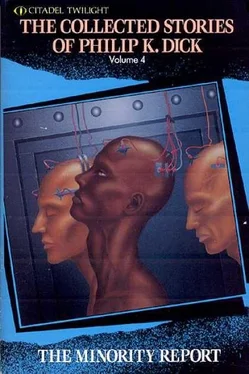Astonished, Gilly said, "But all the pre-cogs are dead. Destroyed by Presidential order twenty years ago."
Tozzo, impressed, said, "He's going to dip back into the past to obtain a pre-cog. Isn't that right, Fermeti?"
"We will, yes," his superior said, nodding. "Back to the golden age of pre-cognition. The twentieth century."
For a moment Tozzo was puzzled. And then he remembered. During the first half of the twentieth century so many pre-cogs – people with the ability to read the future – had come into existence that an organized guild had been formed with branches in Los Angeles, New York, San Francisco and Pennsylvania. This group of pre-cogs, all knowing one another, had put out a number of periodicals which had flourished for several decades. Boldly and openly, the members of the pre-cog guild had proclaimed in their writings their knowledge of the future. And yet – as a whole, their society had paid little attention to them.
Tozzo said slowly, "Let me get this straight. You mean you're going to make use of the Department of Archaeology's time-dredges to scoop up a famous pre-cog of the past?"
Nodding, Fermeti said, "And bring him here to help us, yes."
"But how can he help us? He would have no knowledge of our future, only of his own."
Fermeti said, "The Library of Congress has already given us access to its virtually complete collection of pre-cog journals of the twentieth century." He smiled crookedly at Tozzo and Gilly, obviously enjoying the situation. "It's my hope – and my expectation – that among this great body of writings we will find an article specifically dealing with our re-entry problem. The chances, statistically speaking, are quite good… they wrote about innumerable topics of future civilization, as you know."
After a pause, Gilly said, "Very clever. I think your idea may solve our problem. Speed-of-light travel to other star systems may yet become a possibility."
Sourly, Tozzo said, "Hopefully, before we run out of convicts." But he, too, liked his superior's idea. And, in addition, he looked forward to seeing face to face one of the famous twentieth century pre-cogs. Theirs had been one brief, glorious period – sadly, long since ended.
Or not so brief, if one dated it as starting with Jonathan Swift, rather than with H. G. Wells. Swift had written of the two moons of Mars and their unusual orbital characteristics years before telescopes had proved their existence. And so today there was a tendency in the textbooks to include him.
It took the computers at the Library of Congress only a short while to scan the brittle, yellowed volumes, article by article, and to select the sole contribution dealing with deprivation of mass and restoration as the modus operandi of interstellar space travel. Einstein's formula that as an object increased its velocity its mass increased proportionally had been so fully accepted, so completely unquestioned, that no one in the twentieth century had paid any attention to the particular article, which had been put in print in August of 1955 in a pre-cog journal called If.
In Fermeti's office, Tozzo sat beside his superior as the two of them pored over the photographic reproduction of the journal. The article was titled Night Flight, and it ran only a few thousand words. Both men read it avidly, neither speaking until they had finished.
"Well?" Fermeti said, when they had come to the end.
Tozzo said, "No doubt of it. That's our Project, all right. A lot is garbled; for instance he calls the Emigration Bureau 'Outward, Incorporated,' and believes it to be a private commercial firm." He referred to the text. "It's really uncanny, though. You're obviously this character, Edmond Fletcher; the names are similar but still a little off, as is everything else. And I'm Alison Torelli." He shook his head admiringly. "Those pre-cogs… having a mental image of the future that was always askew and yet in the main -"
"In the main correct," Fermeti finished. "Yes, I agree. This Night Flight article definitely deals with us and the Bureau's Project… herein called Waterspider, because it has to be done in one great leap. Good lord, that would have been a perfect name, had we thought of it. Maybe we can still call it that."
Tozzo said slowly, "But the pre-cog who wrote Night Flight … in no place does he actually give the formula for mass-restoration or even for mass-deprivation. He just simply says that 'we have it.' " Taking the reproduction of the journal, he read aloud from the article:
Difficulty in restoring mass to the ship and its passengers at the termination of the flight had proved a stumbling block for Torelli and his team of researchers and yet they had at last proved successful. After the fateful implosion of the Sea Scout, the initial ship to -
"And that's all," Tozzo said. "So what good does it do us? Yes, this pre-cog experienced our present situation a hundred years ago – but he left out the technical details."
There was silence.
At last Fermeti said thoughtfully, "That doesn't mean he didn't know the technical data. We know today that the others in his guild were very often trained scientists." He examined the biographical report. "Yes, while not actually using his pre-cog ability he worked as a chicken-fat analyst for the University of California."
"Do you still intend to use the time-dredge to bring him up to the present?"
Fermeti nodded. "I only wish the dredge worked both ways. If it could be used with the future, not the past, we could avoid having to jeopardize the safety of this pre-cog -" He glanced down at the article. "This Poul Anderson."
Chilled, Tozzo said, "What hazard is there?"
"We may not be able to return him to his own time. Or -" Fermeti paused. "We might lose part of him along the way, wind up with only half of him. The dredge has bisected many objects before."
"And this man isn't a convict at Nachbaren Slager," Tozzo said. "So you don't have that rationale to fall back on."
Fermeti said suddenly, "We'll do it properly. We'll reduce the jeopardy by sending a team of men back to that time, back to 1954. They can apprehend this Poul Anderson and see that all of him gets into the time-dredge, not merely the top half or the left side."
So it had been decided. The Department of Archaeology's time-dredge would go back to the world of 1954 and pick up the pre-cog Poul Anderson; there was nothing further to discuss.
Research conducted by the U.S. Department of Archaeology showed that in September of 1954 Poul Anderson had been living in Berkeley, California, on Grove Street. In that month he had attended a top-level meeting of pre-cogs from all over the United States at the Sir Francis Drake Hotel in San Francisco. It was probable that there, in that meeting, basic policy for the next year had been worked out, with Anderson, and other experts, participating.
"It's really very simple," Fermeti explained to Tozzo and Gilly. "A pair of men will go back. They will be provided with forged identification showing them to be part of the nation-wide pre-cog organization… squares of cellophane-enclosed paper which are pinned to the coat lapel. Naturally, they will be wearing twentieth century garments. They will locate Poul Anderson, single him out and draw him off to one side."
"And tell him what?" Tozzo said skeptically.
"That they represent an unlicensed amateur pre-cog organization in Battlecreek, Michigan, and that they have constructed an amusing vehicle built to resemble a time-travel dredge of the future. They will ask Mr. Anderson, who was actually quite famous in his time, to pose by their humbug dredge, and then they will ask for a shot of him within. Our research shows that, according to his contemporaries, Anderson was mild and easy-going, and also that at these yearly top-strategy assemblies he often became convivial enough to enter into the mood of optimism generated by his fellow pre-cogs."
Читать дальше










